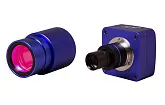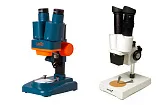How to use prepared microscope slides
A microscope slide set introduces you to an amazing micro world in a quick and simple way. Every slide set includes many prepared processed biological samples. You only need to place one of the samples on the stage and adjust the optics to start studying the slides.
How to study a prepared slide under a microscope:
- Place your microscope on a steady, stable surface. There should be enough space around the microscope for convenient work with the optics.
- Install the eyepiece into the microscope eyepiece tube (if it is not preinstalled).
- If the microscope features illumination light, plug in the microscope to the power supply or install batteries. Turn the light on.
- Take the prepared microscope slide from the set, put it on the stage and fix it in place with the clips. Hold a slide by its edges carefully to prevent leaving fingerprints on the glass.
- Turn the revolving head to study the microscope slide at the lowest magnification. You will need the smallest objective lens.
-
Turn the focusing knobs to bring the objective lens as close as possible to the specimen’s glass. Be careful! Glass can break if excessive force is applied, and the specimen will be ruined.
-
Look through an eyepiece and turn the focusing adjustment knobs to the opposite side so that the objective lens moves away from the microscope slide. Stop when an image becomes as sharp as possible. Study the specimen under the microscope in detail.
- Change the objective lens to achieve higher magnification. Repeat steps 6 and 7.
- If your microscope allows for changing eyepieces, study the specimen using different eyepieces.
Where can prepared microscope slides be found? We have them available in our online store. Find sets of prepared slides in this section. You will find small sets as well as large ones that include dozens of slides and handbooks. We strongly recommend the Levenhuk N38 NG Prepared Slides Set.
Apart from studying prepared microscope slides, you will also be interested in observing various objects. Use whatever comes to hand: a bit of a biscuit, a drop of yogurt from the fridge, a dust ball under the bed, etc. If you are lucky to find a wine cork, you will be able to retry scientific experiments by Robert Hooke who investigated a cell structure and introduced the term “cell” using the above-mentioned specimen.
Any reproduction of the material for public publication in any information medium and in any format is prohibited. You can refer to this article with active link to eu.levenhuk.com.
The manufacturer reserves the right to make changes to the pricing, product range and specifications or discontinue products without prior notice.


